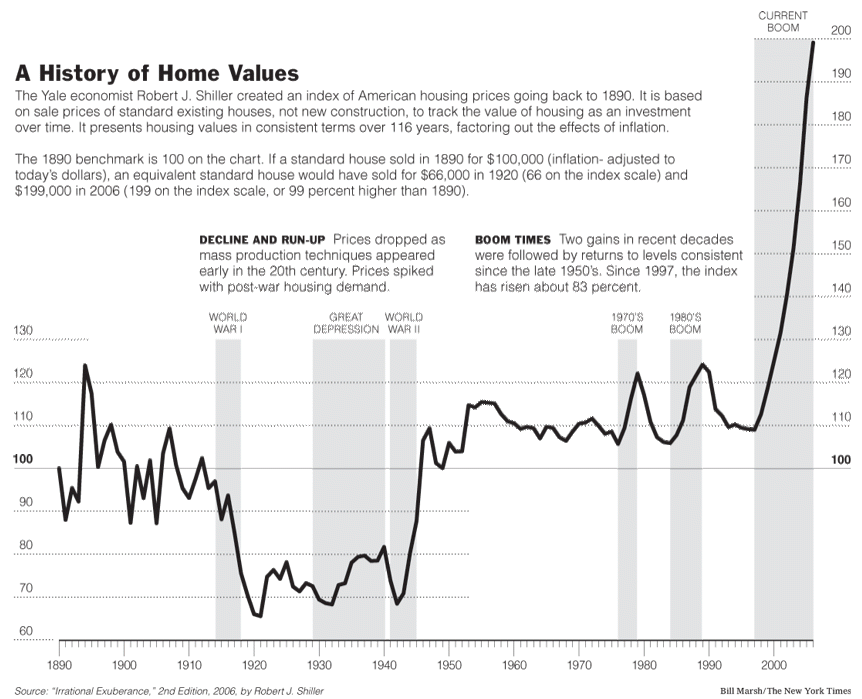|
 |
|||
From the Editor - September 06 |
|||||
|
The commentary below is from our monthly newsletter and is provided here as a convenient reference for our readers. |
|||||
|
Housing Is Front Page News As our readers already know, we at The Prudent Investor have been discussing the rise in housing prices for over a year now. Until recently, the mainstream media was silent on the issue, either because it found other topics more interesting, or because (more likely) the “mainstream” did not consider the housing price rise over the past several years to be anything other than normal. Today, of course, things are different. It’s hard not to find a news station or paper that isn’t discussing the topic of a bubble in housing. Consider the fascinating graph below for a long-term view of housing prices (click graph to enlarge). Almost anyone would look at the graph above and conclude that prices are clearly in bubble territory. After adjusting for inflation, housing prices have been amazingly consistent since the 1950’s, until recently. Now what’s really interesting is that today the average house is about twice the size of the average house in the ‘50s. Given that, one might argue that prices today, on a “per square foot” basis, are in line with prices in the ‘50s. One might argue that, but one might be wrong. The argument would carry more weight had the rise in prices as shown in the graph not been almost vertical since about 2000. So what does this all mean for the economy? The odds have increased that we could see a mild recession in 2007. For a quite bearish perspective, consider the opinion of Mr. Nouriel Roubini, Professor of Economics at the Stern School of Business at New York University. In his recent blog he predicts a rather nasty outcome: So, the simple conclusion…is that this is indeed the biggest housing slump in the last four or five decades: every housing indictor is in free fall, including now housing prices. By itself this slump is enough to trigger a US recession: its effects on real residential investment, wealth and consumption, and employment will be more severe than the tech bust that triggered the 2001 recession. And on top of the housing bust, US consumers are facing oil above $70, the delayed effects of rising Fed Fund and long term rates, falling real wages, negative savings, high debt ratios and higher and higher debt servicing ratios. This is the tipping point for the US consumer and the effects will be ugly. Expect the great recession of 2007 to be much nastier, deeper and more protracted than the 2001 recession. We at The Prudent Investor are expecting a less harsh reality for 2007, but how much of that is wishful thinking is up for debate. Could The Fed Model Be Wrong? If we are headed into a recession, owning stocks is not a great place to be. But the modified Fed Model we follow is suggesting that stocks are undervalued relative to bonds, suggesting now is a great time to buy. Or is it? It’s also possible that the Fed Model is actually saying bonds are overvalued, which we think is the case. That doesn’t mean though that bonds will adjust any time soon. Even if overvalued in general, bonds and other fixed income could be a good buy over the next year. We suggested at the beginning of July that it might be a good time to lock in some longer-term rates since the 10 year Treasury Bill hit 5.14%. Since then rates have fallen about 8% (i.e., 40 basis points) and in all likelihood will fall even more—this is all but certain if we end up in a recession. Staying the Course Our readers know that The Prudent Investor, at the end of the day, does not try to market time based on future (unknown) events. We’ve preached the virtues of following a model—in our case the Fed Model in conjunction with insider trading signals—so as not to let emotions lead investment decisions. Once again, we encourage our readers to stick to their investment plan even with the threat of a recession on the horizon. One caveat is that, for any new money you may have to invest right now, consider waiting until election day (November 7) before investing those funds…or at least wait for a nice market pullback between now and then to invest new funds. September and especially October are historically hard times for the markets, and this year is likely to be the same given all the negative news about housing and it’s possible impact on the economy.
|
|||||
